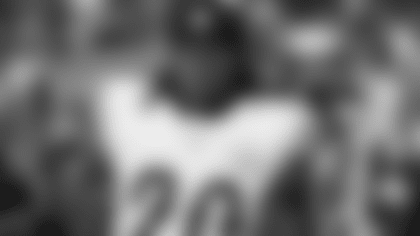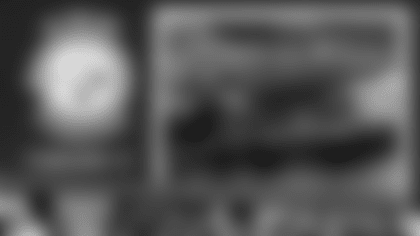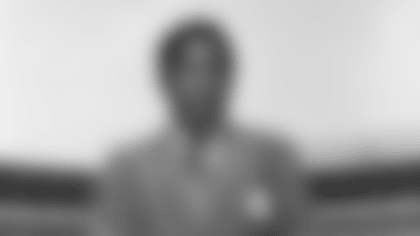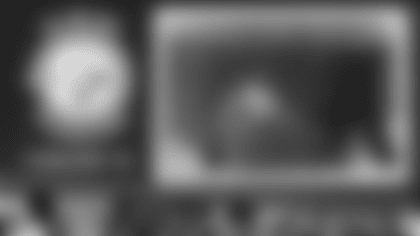Q. At your news conference last Tuesday, you said, "We work our tails off to minimize (injuries). To be smart about how we work our guys – hard and smart – but we acknowledge injuries are a part of the game, and to a degree you have no control over that." How can you work to minimize injuries?
A. Just being sensitive about how and when and where we work. And who we choose to work and the amount of work. There's a lot of technology that's developed in the game of football and across all sports, and we're open to the utilization of it. We put GPS trackers on our guys to measure workload, the speed with which they run, the amount of distance they cover, their workload indexes that measure total workload in terms of change of direction and reactionary movement. We utilize all those things. We utilize our judgment in terms of weeks like this week. Some days the temperature was below 32-degrees and the ground was frozen. If you can't get your cleats in the ground, it's becomes a safer environment to work inside. There are consequences of working inside, too. If you work inside, there is wear and tear on your joints that working outside doesn't give you, because underneath all of those artificial surfaces is concrete, and you don't deal with those things on an outside surface. There are a myriad of discussions in that regard, and we're open to having them in an effort to make sure we work hard and smart to control the element of it that we can control.
Q. Have you found those things to be successful in helping to minimize injuries?
A. You don't know whether it is or isn't helpful, but you know the health and safety of your guys is worth the due diligence. You're open to the infusion of technology into the discussion. You ask others about some of the things they're doing, and not just on the professional level but the college level. I always keep an eye on what's going on next door with the Pitt Panthers in an effort to get better in that area. We all better be open to getting good ideas and not caring where those good ideas come from in an effort to keep our guys upright.
Q. Your philosophy of "the standard is the standard" – how did that come about in terms of you as a coach actually believing backups can fill in for starters with no drop-off in performance?
A. Because it's easy to say we were unsuccessful because somebody wasn't available to us. We just finished talking about how injuries are a part the game, and so why give in to that? Why lower your expectations just because of that? There's a fine line, particularly at the professional level, between being an All-Pro and being a guy who covers kicks. There really is. Both of them were All-Americans at their colleges, and so I feel completely comfortable asking those who cover kicks, when given an opportunity to ascend and have a larger role, to do what's natural. And what's natural for all of these guys is they were the big man on campus when they were on campus. If you put this in a basketball scenario, all of these guys had the ball in the waning moments of their high school basketball games. So I feel completely comfortable asking these guys to deliver on a professional level when given an opportunity to ascend even if that doesn't describe their current roles within the group.
Q. The offense struggled through almost three full quarters in the game against Jacksonville, and in similar situations some coaches might replace the starting quarterback. In general terms, would you consider such a move?
A. I believe it's a play. It's an option, maybe for some, but not one that I seriously entertain. But I can understand why other organizations or teams may do it because you're trying to win football games, and a lot of what we had seen to that point in the game was not moving us in that direction. But I've been in enough stadiums with No. 7 to know – keep watching. So, I do.
Q. So what you're saying is that the reason you wouldn't pull the starting quarterback in looking for a spark is because your starting quarterback is Ben Roethlisberger and not because you're philosophically opposed to that move?
A. It's never a hypothetical discussion for me. It's always a discussion relative to the specific variables we hold. No. 7 is a significant variable, one I will continue to watch, regardless of what I might happen to be seeing in a particular stadium.
Q. I want to take you back to the 2010 NFL Draft, the one where you ended up with both Emmanuel Sanders and Antonio Brown. At that time, what was it that interested you about those two guys?
A. They both had a very similar profile, and that's why we liked them both, and we really gave both of them the same draft grade, to be honest with you. They were that close on our board. They both played the right-slot position in a spread offense, and they were both volume-catch guys. They had over 300 catches apiece in college. The catching of the football was not a question, the hand-eye, the body control, they just had such a volume of catches that it was not a question for either guy. The next thing was, they both showed big-time separation abilities. The ability to create space between themselves and defenders at break-points, and really that's what produced the volume of catches. And for me personally, it was really the first draft where I got comfortable evaluating the college spread offenses and forecast how the guy – the guy in the right slot – can project into being a potential guy in the National Football League. Both of those guys made the process an easy one, they showed skills that they both showed in this setting, and that's why they've had the careers that they've had. Awesome football players.
Q. What separated Antonio Brown from the other two guys in that "young money" group, those other two guys being Sanders and Mike Wallace?
A. To me, it was just what he was willing to do off the grass. That was quite evident. No disrespect to the professionalism of the other two guys and their preparedness, but it was also unique instantly in terms of being able to see that AB's will was different. What he was willing to do was different. He'd walk out of the building every day with eight-to-10 bottles of Gatorade. I said, "Where are you going with all of that Gatorade?" I discovered over time that he was a midnight LA Fitness worker, and he was just hydrating himself. What AB is willing to do on a day-to-day basis produces an outcome that is different than others, because he is willing to do what others won't.
Q. You and your staff coached the AFC squad in the Pro Bowl last year. Beyond the fact that the assignment goes to a coaching staff that has lost in the Divisional Round of the playoffs, how do you view that job?
A. I hated it. Having experienced it, you just don't want to be that team (that lost in the playoffs), but we were that team and so we took the assignment. We took it like a trip to the dentist, but once we got there and had an opportunity to get around the unique players who participate in that game and spend time with them and get to know them on a personal level, and even just on a professional level to see what makes them the players they are, it was an increasingly rewarding experience as the week wore on.
Q. What did you learn from working with those guys?
A. Just that the secret to success is that there's no secret. You better be extremely talented. You better have ridiculous work habits and a unique, scientific approach. It was great to be around the greatest in the game and see the scientific approach to their craft and the way they're willing to share that wisdom and insight with one another. The way they're willing to humble themselves and learn and watch and admire others in close proximity. To watch the defensive backs marvel at the way AB just went about his individual process. Those guys compete against AB in stadiums every weekend, but to watch them go through a practice with him and have them watch him work and admire his talents. To watch Von Miller grab all of the rush-men together and glean information from them and share his expertise in terms of how he plays. It's just a unique environment and an awesome thing.
Q. One of the guys you had at last year's Pro Bowl was Von Miller, and he'll be an opponent today. What makes him special?
A. He's unbelievably talented. He's unbelievably smart. I'm not around him day-to-day, but I imagine those two things converge in terms of work ethic and preparedness. I know the video tells me that, and he's a big-time competitor.
Q. Von Miller is an edge rusher. In the general context of a defense in the NFL is pressure off the edge more important than pressure up the middle?
A. I'll take an edge guy. They're the difference-makers historically in our game. They're the outliers. Often times, your interior rush-men feed off that edge guy. There are multiple ways to get double-teams and minimize a great interior player just because of the close-quarter element of play. You get a unique edge player, there are limited ways to help an offensive tackle, particularly the open-air tackle. That's just football. That's why historically the most significant rushers have been edge rushers, why the historically great offensive tackles are compensated at a rate higher than great guards or centers.
Q. Thanksgiving is something of a mile-marker for each NFL season. As the schedule rolls into December, what are you looking for from your team?
A. We just have to continually be a team that's on the rise, and I know I say that often and it becomes a cliché, but I say if often because it's a heckuva lot more complex than that. To be a team on the rise, you better be a collection of men individually who are on the rise in specific ways. Knowledge of their job and how their job fits into the bigger scheme of things. Global understanding of football, particularly situational football. You can't be a team that's losing in the flat on third down in football as you get into December. You can't have guys wide open in the flat on third-and-2 if you're going to be a good defense, for example. You have to win your share on third-and-2 if you're going to be a good offense in December, for example. I know we need to be a team on the rise, but within that there are a bunch of complex growth opportunities that need to happen, and that's what the day-to-day management of the group is. To keep them moving through this journey, you better win along the way. That's where my focus is. That's what the holidays are about. That's how you stay in the hunt as the road gets narrow, and the road is going to get narrow.
That's what last week was about. That's why we ran into that buzz saw that was Jacksonville, because they were a team that was pressed up against it. And losses at this time of year mean things. They mean things like the end of hopes and dreams. We run into a similar situation today with this Broncos team. They're a group that's up against it. Games like this at this time of year, they know what it means and we know what it means.














